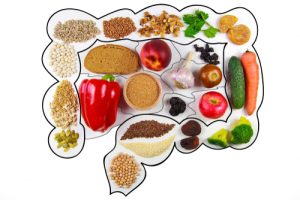Menopause is a natural physiological process that marks the end of a woman’s menstrual cycle and reproductive period. It usually occurs after 40 years and runs for almost 15 years. However, some women might experience premature menopause symptoms because of the removal of their uterus. The severity of the symptoms differ among women; sticking to a plant-based diet with fruits and vegetables might delay or minimize these symptoms.
Menopause symptoms include hot flashes, irregular periods, insomnia, fatigue, headaches, depression, decreased libido, mood swings, joint and muscle pains. Other symptoms include vaginal dryness, bladder incontinence and cold sweats.
Ease Menopause Transition
A plant-based diet can assist women in transitioning smoothly into menopause. Women undergoing menopause should eat whole grains with low calories and fat to maintain their levels of estrogen. Such a diet will reduce hot flashes, sleepless nights and body stiffness. The high fiber decreases appetite and frequent snacking since it makes one feel full. A diet high in fiber will diminish weight gain associated with menopause.
Calcium-rich vegetables such as broccoli and spinach reduce bone weakening. Besides, vitamin D sources such as soy, oranges and mushrooms relieve menopausal symptoms. Soy contains phytoestrogens that balance the decreasing levels of estrogen. Additionally, vitamin E-rich foods such as kiwi, papaya, nuts, red capsicums and dark leafy greens has antioxidant activity, which improves the overall health of menopausal women.
 What Is the Role of Vegetables in Delaying Menopause Symptoms?
What Is the Role of Vegetables in Delaying Menopause Symptoms?
Vegetables that are protein based delay the symptoms and onset of menopause symptoms. Research indicates a decrease in the early occurrence of menopause up to 16% for women ingesting a diet with 6.5% protein. Vitamin D and calcium-rich food reduce the early onset of menopause symptoms. Food rich in protein includes beans, lentils, spinach, almonds, pumpkin seeds, oatmeal, avocado, chickpeas, lima beans, chia seeds, spirulina, quinoa, corn and soybeans.
Effects of a Plant-Based Diet
Hormones play a vital role in physiological processes such as metabolism, menstrual cycle, reproduction and the immune system. Menopausal symptoms occur after a significant drop in estrogen in the body. Phytoestrogens in soybeans and flaxseeds bind to the estrogen receptors through isoflavones and lignans, respectively.
Women experiencing menopause symptoms often see an increase in body weight, partly due to insulin resistance. Eating refined carbohydrates increases sugar levels in the bloodstream, leading to a situation where the cells in the liver, fat and muscles respond inappropriately. Therefore, eating oats, whole grains, bread, lentils, vegetables and bran reduces menopausal symptoms such as weight gain.
Balance Hormones with Fruit
Women undergoing menopause can regulate their stress levels by eating vitamin B-rich food such as beans, oatmeal, eggs, yogurt, collard greens, bananas and broccoli. Menopausal symptoms, characterized by increased cortisol, regulates stress, fear, blood pressure and sugar levels. There are eight types of vitamin B available, and vitamin B12 is available for vegetarians. Reducing the levels of cortisol minimizes the accumulation of fat around the midsection areas.
Vegetables and fruits containing beta-carotene, lycopene and vitamin C produce antioxidant effects that help alleviate menopausal symptoms. Additionally, fruits containing these substances improve the physical capabilities and energy of menopausal women. Such fruits include carrots, pineapples, oranges and mangoes.
Since many women experiencing menopause need to cut their consumption of fat, they also require a daily intake of healthy fat in the diet. Healthy fat is essential for the digestion of lipid-soluble vitamins such as A, E, K and D. A lack of these vitamins results in deficiency and worsening of hormonal imbalances in menopause. Avocados, nuts, chia seeds, olives and sardines contain healthy fat.
 Biotic and Fiber Foods
Biotic and Fiber Foods
The balance of gut bacteria is essential in balancing hormones and overall health. Gut bacteria population is increased by the consumption of pre- and probiotic food such as kefir, yogurt, miso and sourdough bread. Prebiotic food include beans, lentils, fruits and whole grains with high fiber content, while probiotics are fermented food. Fiber helps restore estrogen imbalance responsible for anxiety, mood swings and weight gain.
Thyroid Hormone Balance
The thyroid participates in controlling hormones involved in menopause, such as estrogen, and thus, iodine intake is essential. Thyroid hormones regulate metabolism, mood and weight in women, which constitute some of the menopausal symptoms. Iodine and selenium intake can prevent the development of thyroid diseases such as goiter, hypothyroidism or hyperthyroidism.
Women approaching or experiencing menopause can reduce menopausal symptoms by eating Brazil nuts that are rich in selenium. Additionally, iodine is supplemented in food by eating seaweed or using iodized salt while cooking.

 What Is the Role of Vegetables in Delaying Menopause Symptoms?
What Is the Role of Vegetables in Delaying Menopause Symptoms? Biotic and Fiber Foods
Biotic and Fiber Foods



